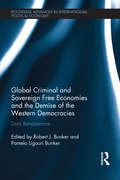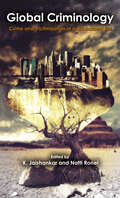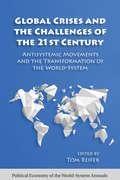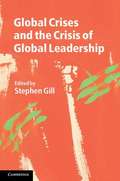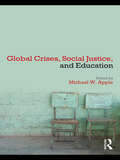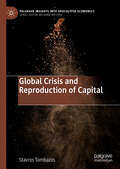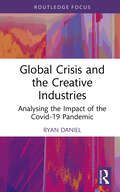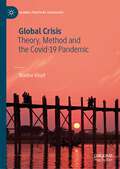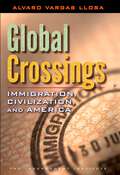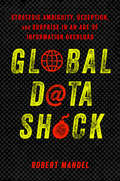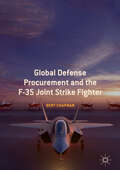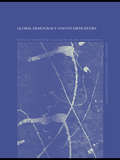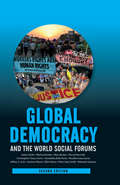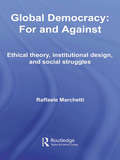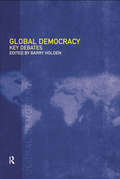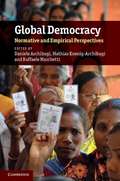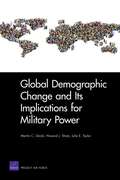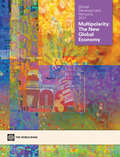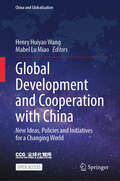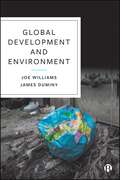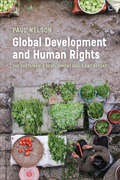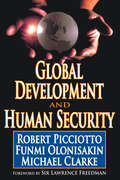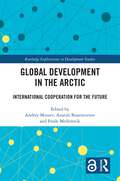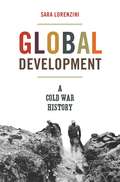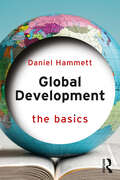- Table View
- List View
Global Criminal and Sovereign Free Economies and the Demise of the Western Democracies: Dark Renaissance (Routledge Advances in International Political Economy)
by Robert J. Bunker Pamela Ligouri BunkerMuch has been written about the many economic benefits of globalization and the triumph and spread of democratic liberalism with the end of the Cold War, following the demise of the Soviet Union. This work takes issue with such "wine and roses" perspectives about the future of the Western democracies and their faith-based views on the moral purity of a globalized marketplace. It also questions many of the assumptions found in the status quo reinforcing discipline of international political economy (IPE)—a discipline that focuses on the formal and legitimate economies and the façade they present that international relations and commerce is still dominated and dictated solely by the old Westphalian state centric system. Having highlighted these concerns, this book looks at two major themes. The first theme focuses on the theoretical perception that a "Dark Renaissance" is taking place globally—one in which the Western liberal democracies and its citizens are ill prepared to respond because it exists at the trans-civilization level, bridging the modern to the post-modern world. The second theme focuses on the actual process of state deconstruction that is taking place. This process is leading to what may become the very undoing of the democracies. Drawing together experts from a variety of backgrounds, this work explores the increasing shift away from formal based capitalism and evaluates through case studies how different states are responding to the challenges they face. This work will be of great interest to students and scholars of international political economy.
Global Criminology: Crime and Victimization in a Globalized Era
by K. Jaishankar Natti RonelGlobal criminology is an emerging field covering international and transnational crimes that have not traditionally been the focus of mainstream criminology or criminal justice. Global Criminology: Crime and Victimization in a Globalized Era is a collection of rigorously peer-reviewed papers presented at the First International Conference of the So
Global Crises and the Challenges of the 21st Century (Political Economy of the World-System Annuals)
by Thomas ReiferDespite prognostications of the "end of history," the 21st century has posed new challenges and a host of global crises. This book takes up the current global economic crisis in relation to new and changing dynamics of territory, authority, and rights in today's global system. The authors explore long simmering conflicts in comparative perspective, including settler colonialism in South Africa, Northern Ireland and Israel/Palestine. They discuss indigenous struggles against environmental land grabs and related destruction of indigenous lands by the US nuclear weapons complex. The book uniquely considers the sacred in the context of the global system, including struggles of Latina/o farm workers in the U.S. for social justice and for change in the Catholic Church. Other chapters examine questions of civilizations and identity in the contemporary global system, as well as the role of world-regions.
Global Crises and the Crisis of Global Leadership
by Stephen GillThis groundbreaking collection on global leadership features innovative and critical perspectives by scholars from international relations, political economy, medicine, law and philosophy, from North and South. The book's novel theorization of global leadership is situated historically within the classics of modern political theory and sociology, relating it to the crisis of global capitalism today. Contributors reflect on the multiple political, economic, social, ecological and ethical crises that constitute our current global predicament. The book suggests that there is an overarching condition of global organic crisis, which shapes the political and organizational responses of the dominant global leadership and of various subaltern forces. Contributors argue that to meaningfully address the challenges of the global crisis will require far more effective, inclusive and legitimate forms of global leadership and global governance than have characterized the neoliberal era.
Global Crises, Social Justice, and Education
by Michael W. AppleEducation cannot be understood today without recognizing that nearly all educational policies and practices are strongly influenced by an increasingly integrated international economy. Reforms in one country have significant effects in others, just as immigration and population tides from one area to another have tremendous impacts on what counts as official knowledge and responsive and effective education. But what are the realities of these global crises that so many people are experiencing and how do their effects on education resonate throughout the world? Global Crises, Social Justice, and Education looks into the ways we understand globalization and education by getting specific about what committed educators can do to counter the relations of dominance and subordination around the world. From some of the world’s leading critical educators and activists, this timely new collection provides thorough and detailed analyses of four specific centers of global crisis: the United States, Japan, Israel/Palestine, and Mexico. Each chapter engages in a powerful and critical analysis of what exactly is occurring in these regions and counters with an equally compelling critical portrayal of the educational work being done to interrupt global dominance and subordination. Without settling for vague ideas or romantic slogans of hope, Global Crises, Social Justice, and Education offers real, concrete examples and strategies that will contribute to ongoing movements and counter-hegemonic struggles already active in education today.
Global Crisis and Reproduction of Capital (Palgrave Insights into Apocalypse Economics)
by Stavros TombazosThis Palgrave Pivot uses Marxian economic categories and analysis to explore the deeper causes of the 2008 global economic crisis, what the crisis represents for capitalism, and why fiscal and monetary policies pursued in its wake have failed to rejuvenate economies.With an innovative interpretation of the crisis and a focus on 'toxic capital’ – a sub-division of Karl Marx’s concept of fictitious capital – Tombazos examines the specificities of economic reproduction under neoliberalism and financialisation.
Global Crisis and the Creative Industries: Analysing the Impact of the Covid-19 Pandemic (Routledge Focus on the Global Creative Economy)
by Ryan DanielWorkers in the creative industries are highly motivated, resilient, and innovative and these characteristics have come to the fore during the global health and resultant economic crises enveloping the world. This shortform book analyses transformation in the arts as a result of this era of polycrisis. The author interrogates public policy, legislative developments, and financial support systems to assist the arts sector around the world. Utilising interview responses from various artis and creatives, the book takes the impact of the Covid-19 pandemic on the global creative industries as its central case study. It looks at the historical relationship between art and times of global crises, the policy initiatives implemented around the world in response to Covid-19 to rescue and support creative industries, explores the ways in which audiences, artists, and creatives responded during the first year of the pandemic, and looks towards future opportunities for the creative industries sector. The book also highlights the importance of higher education for the future creative industries workforce. Providing a concise, yet holistic interpretation of the early impact of the pandemic, the book summarises recent developments, and proposes future directions relevant to students and scholars involved in the creative economy.
Global Crisis: Theory, Method and the Covid-19 Pandemic (Global Political Sociology)
by Nadine KlopfThe book develops a novel framework for the analysis of global crises. It differentiates crises on three dimensions: permanent, recurring and ephemeral crises. This conceptualization allows us to analyze global crises not only in their immediate environment, but makes it possible to understand them in the broader context of social instability. The approach revolves around the terminology of discursive dislocation which provides fundamental insights into diverse forms of social instability. A multidimensional conceptualization of dislocation is advanced which informs the differentiation of global crises. Furthermore, a methodological toolkit is developed and tailored to the theoretical framework, which makes it possible to utilize the book both theoretically and methodologically for the analysis of manifold forms of global crises. The book also provides a comprehensive analysis of the Covid-19 pandemic in the United States under Donald Trump. Making use of the aforementioned methodology, it presents a hands-on illustration of how the multidimensional framework can be utilized for practical analyses. The analysis reveals how the construction of the Covid-19 pandemic is embedded in the historically ingrained self-portrayal of the United States, and how crisis responses are invoked to serve particular socio-political purposes in retaining an established vision of the United States.
Global Crossings: Immigration, Civilization, and America
by Alvaro Vargas LlosaImmigration still elicits fear and mistrust, and not just on the part of the &“receiving&” society despite having occurred for thousands of years throughout human history. Communities from which people migrate often disapprove of the migrants&’ decision and consider it treacherous. The recent reawakening of the debate about immigration in the new millennium has evoked intense emotion particularly in the United States and Europe.Global Crossings cuts through the jungle of myth, falsehood and misrepresentation that dominates the debate, clarifying the causes and consequences of human migration. Why do millions of people continue to risk their lives, and oftentimes lose them, in the pursuit of a chance to establish themselves in a foreign land? The book first looks at the immigrant experience, which connects the present to the past, and America to the rest of the world, and explores who migrants are and why they move. The conduct of migrants today is no different than that of migrants in the past. And contrary to the claims by immigration critics, the patterns of contemporary migration do not differ fundamentally from those of other epochs. Global Crossings then discusses immigration regarding culture. To what degree are foreigners culturally different? Can natives adapt? Can immigrants assimilate into the new society? In assessing whether critics are justified in pointing to a major cultural shift Alvaro Vargas Llosa reviews such topics as religion, education, entrepreneurial spirit, and attitudes toward the receiving society. The book then analyzes such economic factors as jobs, wages, education, and the welfare state. How can an economy continue to operate even in the face of major legal obstacles, and how have recessions and times of prosperity influenced—more significantly than government efforts—the number of immigrants coming into the United States and other countries? Vargas Llosa finds that immigration&’s contributions to an economy far outweigh the costs. Finally Global Crossings makes a call for open minds and provides a pro-immigration agenda for reform. The erosion of national boundaries—and even the idea of the nation state—is already underway as people become ever more inter-connected across borders. This process will make immigration a defining force in the arena of competitive globalization and the people of those countries who embrace immigration will enjoy more prosperous, peaceful, and freer lives in the emerging world.
Global Data Shock: Strategic Ambiguity, Deception, and Surprise in an Age of Information Overload
by Robert MandelIntelligence and security communities have access to an overwhelming amount of information. More data is better in an information-hungry world, but too much data paralyzes individual and institutional abilities to process and use information effectively. Robert Mandel calls this phenomenon "global data shock." He investigates how information overload affects strategic ambiguity, deception, and surprise, as well as the larger consequences for international security. This book provides not only an accessible framework for understanding global data shock and its consequences, but also a strategy to prepare for and respond to information overload. Global Data Shock explores how information overload facilitates deception, eroding international trust and cooperation in the post-Cold War era. A sweeping array of case studies illustrates the role of data shock in shaping global events from the 1990 Iraqi attack on Kuwait to Brexit. When strategists try to use an overabundance of data to their advantage, Mandel reveals, it often results in unanticipated and undesirable consequences. Too much information can lead to foreign intelligence failures, security policy incoherence, mass public frustrations, curtailment of democratic freedoms, and even international political anarchy. Global Data Shock addresses the pressing need for improved management of information and its strategic deployment.
Global Defense Procurement and the F-35 Joint Strike Fighter
by Bert ChapmanThis book analyzes the development and evolution of the F-35 Joint Strike Fighter, a multinational aircraft endeavor involving the U.S. and many of its allies. The author provides a historical overview of jet fighter aircraft, discussing the different generations of these planes and their technical characteristics, as well as an outline of emerging international geopolitical and security trends the F-35 may see combat in. By examining the role of defense industries, domestic politics, and governmental oversight of the Joint Strike Fighter in various countries, the author concludes that this aircraft will be deployed in most of these countries to replace their aging jet fighter fleets and combat potential military aggression from China, Russia, and other revisionist international powers.
Global Democracy and its Difficulties (Challenges of Globalisation)
by Anthony J. Langlois Karol Edward SoltanThe political project of extending democracy to the global level is seen as the next major challenge for proponents of democracy. This volume considers some of the difficulties which need to be overcome for this extension to take place. The issues discussed include: Philosophical and theoretical questions about the nature of democracy and the justification of its values Pressing political considerations, such as the crucial role of elections in democracy promotion Legal developments, such as the role of international law and judicial networks The nature of the global political space as democratization brings challenges to the ways in which systems have traditionally been organized Global Democracy and its Difficulties will appeal to a range of academics, scholars and students who work across fields such a political theory, international law, comparative politics and political economy. It will be of particular interest to those with an interest in the political, economic, legal and moral aspects of democratization.
Global Democracy and the World Social Forums (International Studies Intensives Ser.)
by Donatella Della Porta Marc Becker Jackie Smith Christopher Chase-Dunn Marina Karides Dorval BrunelleThe World Social Forum quickly became the largest political gathering in human history and continues to offer a direct challenge to the extreme inequities of corporate-led globalisation. It has expanded its presence and continues to be an exciting experiment in global and participatory democracy. The book's contributors have participated in World Social Forums around the globe. Recounting dozens of dramatic firsthand experiences, they draw on their knowledge of global politics to introduce the process, its foundations and relevance to ongoing transnational efforts toward democracy. This second edition of Global Democracy shows how the Forums have developed since their inception in 2001 and how they are now connected with other global movements including Occupy, the Arab Spring and beyond.
Global Democracy: Ethical Theory, Institutional Design and Social Struggles (Democratization Studies)
by Raffaele MarchettiThis book defends the case for the expansion of the democratic model to the global political sphere. Concentrating on the democratic deficit of international affairs, it examines the nexus between the phenomenon of international exclusion and the political response of global democracy. This distinctive position is developed through a critical survey of the principal theories for and against global democracy. The main rival narratives (realism, nationalism, civilizationism, and liberal internationalism) are rebutted on grounds of failing democratic principles of inclusion. Based on a notion of interaction-dependent justice, these theories arguably provide a crucial ideological support to the exclusionary attitude of the current international system. Going beyond these exclusionary paradigms, the book defends a model of cosmo-federalism that is all-inclusive, multilayered and rooted. The text adopts an interdisciplinary perspective that combines three areas of scholarship: international political theory, international relations and political sociology. Within them, a number of contemporary controversies are analyzed, including the ethical dispute on global justice, the institutional debate on supranationalism, and the political discussion on social emancipatory struggles. From such an interdisciplinary perspective derives an engaged text that will be of interest to students and researchers concerned with the key political aspects of the discussion on globalization and democratic global order.
Global Democracy: Key Debates (Political Theory And Contemporary Politics Ser.)
by Barry HoldenThis book presents the key debates about globalisation and links them with the growing, related discussion of the possible development of global democracy.Global Democracy presents the literatures of globalisation and democracy to explore the major debates. The first part of the book brings together three major theorists and three critiques of their work - David Held on the potential advantages of globalisation for the furtherance of democracy; Paul Hirst questioning the idea of globalisation and Danilo Zolo on the need for some kind of international governance. The second part of the book looks at structures and processes, such as the UN, global civil society, state sovereignty, the EU and democratisation from major thinkers such as Boutros Boutros-Ghali.This book provides exposition and critical examination of the latest thinking of leading authorities in the newly important fields of globalisation and global democracy. It will be a valuable textbook and resource for students of International Relations, Politics, Political Theory, and those taking courses in democratisation and globalisation.
Global Democracy: Normative and Empirical Perspectives
by Daniele Archibugi Mathias Koenig-Archibugi Raffaele MarchettiDemocracy is increasingly seen as the only legitimate form of government, but few people would regard international relations as governed according to democratic principles. Can this lack of global democracy be justified? Which models of global politics should contemporary democrats endorse and which should they reject? What are the most promising pathways to global democratic change? To what extent does the extension of democracy from the national to the international level require a radical rethinking of what democratic institutions should be? This book answers these questions by providing a sustained dialogue between scholars of political theory, international law and empirical social science. By presenting a broad range of views by prominent scholars, it offers an in-depth analysis of one of the key challenges of our century: globalizing democracy and democratizing globalization.
Global Demographic Change and Its Implications for Military Power
by Martin C. Libicki Howard J. Shatz Julie E. TaylorWhat is the impact of demographics on the prospective production of military power and the causes of war? This monograph analyzes this issue by projecting working-age populations through 2050; assessing the influence of demographics on manpower, national income and expenditures, and human capital; and examining how changes in these factors may affect the ability of states to carry out military missions.
Global Development and Cooperation with China: New Ideas, Policies and Initiatives for a Changing World (China and Globalization)
by Henry Huiyao Wang Mabel Lu MiaoThis open access book draws on the insights and wisdom of representatives from a wide range of international organizations with a presence in China, leveraging their rich experience in their respective fields as well as their unique understanding of China’s development and its role in the world. In a world of increased tension between governments and a rise in regionalism, globally positioned non-governmental international organizations are key to keeping the lines of communication open. In addition to the United Nations and its affiliate organizations, a host of international organizations are ensuring that the world’s most pressing issues, in areas ranging from economics to education, are being discussed. This new book focuses on the latest trends in four major areas—global governance, trade and economics, science and technology, and culture and exchange—providing the reader with information on the latest developments in these areas with a special focus on China and its relevant contributions. It is hoped that this book will inspire deeper discussion and consideration of the issues we face as a global community and how non-governmental entities can play a stabilizing role in global communication and in exploring solutions to common challenges.
Global Development and Environment
by Joe Williams James DuminyAvailable open access digitally under CC-BY licence. Development and environmental challenges are often framed at the global or planetary scale, but in a vague or apolitical manner. This book develops a theoretically rigorous and politicized concept of the planetary to intervene in contemporary debates on global development and to enhance our critical understanding of development as we approach the second quarter of the twenty-first century. Chapters explore key themes and processes including urbanization, demographic change, health, financialization, and infrastructure development. Referencing diverse cases and examples drawn from across the world, the book argues that the futures of global development are inseparable from environmental challenges and transformations.
Global Development and Human Rights: The Sustainable Development Goals and Beyond (UTP Insights)
by Paul NelsonFrom 2000 to 2015 the Millennium Development Goals (MDGs) mobilized external aid to finance life-changing services in the global South. However, in doing so, the organization failed to meet the challenges often associated with human rights initiatives, which are to make underprivileged communities independently prosperous, equitable, and sustainable. In Global Development and Human Rights, Paul Nelson assesses the current thirty-year effort to make transformative changes in the global South by exploring how this disconnect from human rights weakened the MDGs reputation as a successful aid organization. To overcome the failings of the MDGs, the Sustainable Development Goals (SDGs) were formed in 2016 with the intention of managing the issues fundamentally ignored by the MDGs. Drawing on twenty-five years of research on development goals, human rights, and the organizations that promote them, Nelson reasons that transformative change arises out of national and local movements, and shows how human rights can offer leverage and political support that help drive transformative national initiatives.
Global Development and Human Security
by Robert PicciottoGlobal Development and Human Security explores the possibility of connecting all countries to the global economy while defusing the social tensions and managing the security risks that can result from exposure to a turbulent international system. The complex intersection between security and development policies has not been adequately mapped or explored. Frail and failing states that lack sound market and security institutions are the weak links in an interconnected global system. Yet aid allocation principles discourage engagement with these "difficult partners," and the insular culture of development assistance hinders interaction with the security community. In a world beset by "problems without passport" (infectious diseases, environmental pollution, international crime, conflict spillovers, terrorism, etc.), a new paradigm should supplant the now obsolete development consensus.The authors took stock of current development practices through the prism of Sweden's Shared Responsibility bill, which addresses peace, security, opportunity, environmental conservation, human rights, and democracy. The resulting volume draws the implications of emerging threats to global peace and prosperity for development policy and practice. It seeks to build bridges of understanding between the development community and the security establishment by bringing together lessons of experience currently scattered in the literature. Each chapter is self-contained and includes policy findings and recommendations.The book is principally aimed at practitioners who need up-to-date knowledge about security and development issues. Publication of this paperback edition makes the book available for use as an introductory text for security specialists with little knowledge of development or for development specialists with limited knowledge of security, or for college or university students in these areas.
Global Development in the Arctic: International Cooperation for the Future (Routledge Explorations in Development Studies)
by Anatoli Bourmistrov Frode Mellemvik Andrey MineevViewing the Arctic as a key region for global development in the 21st century, this book offers a cross-disciplinary conceptual framework for understanding what international cooperation is, why it is difficult and what kind of alternative views can apply in the Arctic. Written by Arctic experts, the book presents major trends and scenarios for international cooperation in the Arctic up to 2035 and future prospects for international cooperation in the Arctic in various sectors: energy, business and economy, transportation and logistics, climate change, diplomacy and security, culture, innovations, higher education and research. Implications of the scenarios for global development are discussed in the light of the United Nations Agenda for Global Development and Sustainable Development Goals (SDGs). The book offers a cross-disciplinary conceptual framework of international cooperation in the Arctic and discusses implications of this framework for global development. Filling the gap in analytical understanding of international cooperation, this book will be of interest to academics, students and professionals concerned with global development and the Arctic region.
Global Development: A Cold War History (America in the World #38)
by Sara LorenziniIn the Cold War, "development" was a catchphrase that came to signify progress, modernity, and economic growth. Development aid was closely aligned with the security concerns of the great powers, for whom infrastructure and development projects were ideological tools for conquering hearts and minds around the globe, from Europe and Africa to Asia and Latin America. In this sweeping and incisive book, Sara Lorenzini provides a global history of development, drawing on a wealth of archival evidence to offer a panoramic and multifaceted portrait of a Cold War phenomenon that transformed the modern world.Taking readers from the aftermath of the Second World War to the tearing down of the Berlin Wall, Lorenzini shows how development projects altered local realities, transnational interactions, and even ideas about development itself. She shines new light on the international organizations behind these projects—examining their strategies and priorities and assessing the actual results on the ground—and she also gives voice to the recipients of development aid. Lorenzini shows how the Cold War shaped the global ambitions of development on both sides of the Iron Curtain, and how international organizations promoted an unrealistically harmonious vision of development that did not reflect local and international differences.An unparalleled journey into the political, intellectual, and economic history of the twentieth century, this book presents a global perspective on Cold War development, demonstrating how its impacts are still being felt today.
Global Development: The Basics (The Basics)
by Daniel HammettHow do we try to make the world a better place, when the challenges of poverty, disease, war, conflict, and climate change continue to impact millions of lives? Global Development: The Basics is a lively and engaging introduction to the shifting landscape of global development, right from its origins, to present-day problems, and on to what the future for global development might look like. Recognising global development as an economic, political, and social project, this book tackles a series of critical questions: asking ‘what’ development is and how it is measured, where and to whom it is assumed to happen, how its approaches are developed, and whose benefit do they serve? The book invites readers to consider the complexities and challenges of the concept of development, including its historical roots in colonialism, and the geopolitical power relations which continue to set much of the agenda. It investigates whose voices are included or silenced in dominant approaches to development, and the growing importance of ‘non-traditional’ development funding and approaches. Covering key topics in the field, from economics and politics, through to gender and climate change, Global Development: The Basics is perfect for readers starting out in their understanding of global development.
